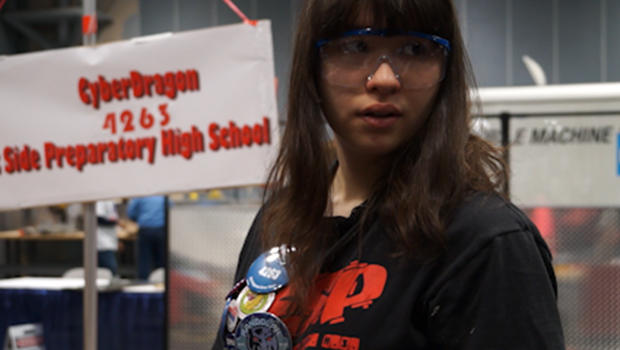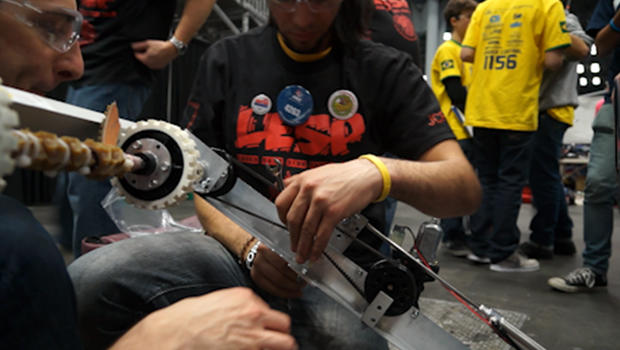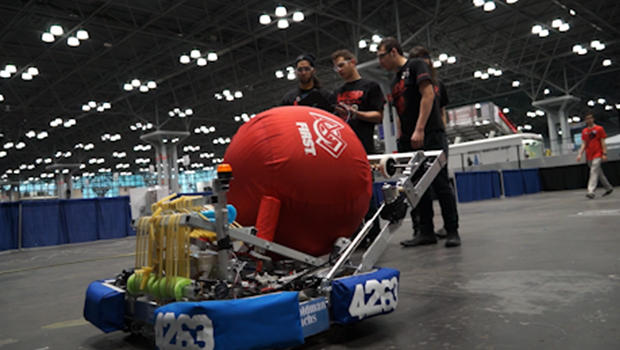"Robotics changed my life": A troubled teen finds her calling in tech
As captain of the robotics team at Lower East Side Preparatory High School in New York City, Freya Wilhelm spent the first weekend of April commandeering a robot around a fluorescent green turf field at the NYC FIRST Robotics Regional Championship.
She listened as teammates described technical issues and thoughtfully suggested solutions; she asked for advice when the robot unexpectedly stopped on the playing field; she kept her composure when the catapult malfunctioned.
In the fall of 2012, Wilhelm dropped out of her arts high school. She knew her passion for art had faded, but she had no idea what she would do next. Transferring to LESPHS did little to change her attitude. Feeling lost, she started skipping classes more often than not.
"I was going through a lot of challenges in my life. I struggled with substance abuse, relationship problems, I had no social skills," she tells CBS News. "I had no direction in my life."
Then, last spring, a friend asked her to join the school robotics team. The Cyber Dragons compete against other schools from around the area, as well as a few international teams, in the annual NYC FIRST Regional Championship. In similar events around the country, teams vie for a spot in the National Robotics Championships.
The events are part of National Robotics Week. High-school teams have six weeks to build a robot to compete in a designated robot sport, which changes each year. Middle- and elementary-school students compete in LEGO League challenges, designing robots that could help with disaster relief. Besides the competitions, there are events at the Smithsonian National Air and Space Museum and smaller venues throughout the week.
Celebrating its fifth year, the goal of the week is to inspire students to think about careers in math, science, technology and engineering, as well as to educate the public on ways robotics will shape the future.
When Wilhelm's friend invited her to join the team last year, the six-week building season was already well under way. At first she kept to herself, watching the team build and sticking around afterwards to clean up.
Slowly, she started taking on responsibilities, like building parts. Those skills led to the first big change.
"Because I started learning to use power tools and working with dangerous equipment, I realized I can't show up without being sober and work with these things because I'm just putting myself at risk and others at risk," she says. "And that really helped me stop abusing substances."She also learned a lot about teamwork.
"Before I joined the team I was not a very social person, and I was not very good at listening to other people," she says.
After getting a taste of challenge last year, she was eager to join for the full 2014 season. But she didn't just want to join -- she wanted to lead, and decided to run for captain. She won.
"This year I have to help people come to agreements," she says. "That's something I never thought I could do."
The Cyber Dragons, with Wilhelm as captain, went through three or four designs before settling on the one they used in this year's competition. The weekend didn't go exactly as planned -- there were a few technical issues -- but as far as coach and teacher Henry Ruan is concerned, it was a success.
"I have a lot of kids who will tell you they fail a lot of subjects, but they just really love this," he says. As they build robots from scratch, as they learn how to use 3D-design technology and are trusted to use power tools, they are learning valuable life lessons that you cannot get from reading a book or sitting in a classroom.
"There are all kinds of learning, and this kind of learning is one that the student needs," says Ruan. "It boosts their self confidence and I think this lifetime experience is very positive for their futures."
For Wilhelm, it's more than a positive impact on her future. It's a chance to have one.
"Before I joined the robotics team, I gave up on art school. I had no plan with what I wanted to do with my life," she says. "Being introduced to robotics, I was introduced to a lot of things within robotics. Now, I want to go to college for mechanical engineering and I hope to continue to work with robotics.
"So, it really changed my life."



